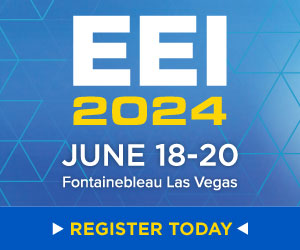A visit with Burns & McDonnell in Atlanta
PUF's Angela Hawkinson, Editor, and Steve Mitnick, Editor-in-Chief, recently visited the Atlanta area offices of Burns & McDonnell, in Alpharetta, Georgia. We spent the day talking with some of the young and diverse engineers that are leading the way for our industry, and we took a ton of pics too. Here we excerpt five of the interviews, with Oko Buckle and Dotun Famakinwa, Jose Alvarez, Misam Taherbhai, Justin Kanitz and Hill Baughman.
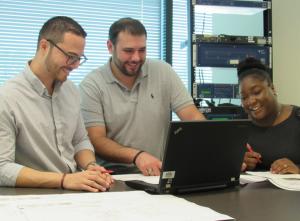
These brief interviews are a fascinating window to see how today's engineers work. Times have surely changed. We didn't spot one slide rule the whole day.
Oko Buckle and Dotun Famakinwa
PUF's Steve Mitnick: Oko, what do you do here?
Oko Buckle: I help run the office of Burns & McDonnell in the southeast.
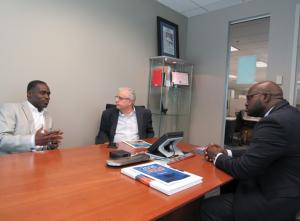 From left: Oko Buckle, Steve Mitnick and Dotun Famakinwa
From left: Oko Buckle, Steve Mitnick and Dotun Famakinwa
We try to make sure that we are getting the right people on board. Then, we try to make sure those people are in the right seats.
We make sure that the people working here are very fulfilled so they stick with us for the long term. At Burns & McDonnell, our turnover rate is very low. I think there are some things we do right that make this business very attractive to almost all professionals.
That's the people side. Then we work with the managers to ensure that we are really working with the right clients.
We are fortunate to work with many great clients who appreciate the constructive value we bring. We seek out the toughest challenges and most difficult assignments and we earn the trust of our clients when we come through for them. One great example is Georgia Power, a client we have worked with for more than twenty years.
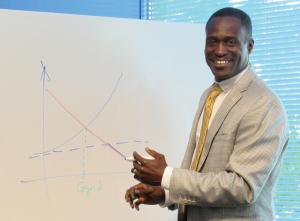 Oko Buckle
Oko Buckle
PUF's Steve Mitnick: How did you get to this point in your career?
Oko Buckle: It was a long journey. I didn't grow up in this country. I grew up in a small country in Africa; it's the best country in Africa, Ghana.
I went to school there all the way through university. I did my first degree in electrical engineering.
I come from a family of twelve kids. I just got back from celebrating my mother's ninetieth birthday, and it was the first time since 1976 for all of us to be in one place at the same time. All twelve kids with my mom.
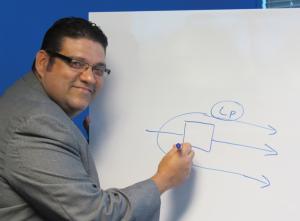 José Rodriguez Alvarez
José Rodriguez Alvarez
I did my undergrad back home. Graduated in 1994. Worked for a company that worked for GE in Ghana, and was part of the team that started building the very first thermal power plant in Ghana.
Midway through that project I got accepted into Texas A&M.
I came to Texas A&M to do my masters' degree in power systems, electrical engineering, and graduated in 1998.
In 1999, I started working for a company in Kansas City. I worked there for seven years. That's when I got to know Dotun, here. We both had a plan to start a business of our own, to go off on our own.
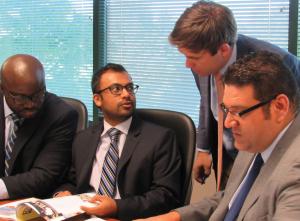 Misam Taherbhai (seated)
Misam Taherbhai (seated)
Then I found Burns & Mac. I came here and thought, "Okay, this is actually the closest that you can get to running your own business." It's a company that empowers you to be very entrepreneurial, number one. And they expose you to all the tools and resources that they have to make you successful.
Here, for the first time, I would be working on a project and I knew exactly what my budgeted hours were, what the dollar amount was, and what the expected profitability on the project was supposed to be.
It put me more in control. That was when I called Dotun and said, "This is the place you need to come to." He's been here with me for some time now.
I started here as a senior electrical engineer, to help start the substation group of transmission and distribution.
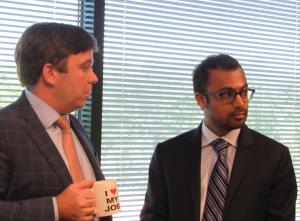 From left: Justin Kanitz and Misam Taherbhai
From left: Justin Kanitz and Misam Taherbhai
My boss ended up quitting suddenly after about three years. I applied for his job to head the transmission & distribution global practice, and I was successful.
I surrounded myself with very smart guys. Dotun is one of them. They worked hard. When my boss decided to retire, I applied for the job, and with the successes that these guys helped me achieve, I was selected for this job.
It's been good mentoring, good networking, having the support of good people around you.
PUF's Steve Mitnick: Dotun, what do you do, and how did you get here to Burns and McDonnell?

Dotun Famakinwa: I help Oko run the transmission and distribution practice here in the southeast. Our region stretches from the Carolinas all the way out to Mississippi, Florida, Georgia, and Alabama.
I came to this country in 1994. I'm from Nigeria; it's the best country in Africa. In the U.S., I started off in North Dakota. I was supposed to go to the United Kingdom and be an oil man. Our country was heavy into oil at the time.
It's just by fate, I guess, that I didn't go there. My visa was delayed. I ended up coming Stateside instead. I was one of the first in my family to come to the U.S.
Oko and I started work about a week apart, at a company in Kansas City. I worked there for a while, and then worked building coal plants around the midwest. I was with a muni at the time, Indiana Municipal Power Agency.
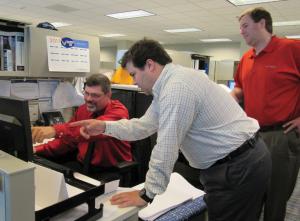
Then Oko called me and told me about Burns & McDonnell. I came down here almost eight and a half years ago, also as a senior electrical engineer.
It's really about the people you surround yourself with, who can make it successful for you. We've surrounded ourselves with people who are very technically sound and very hard working.
PUF's Steve Mitnick: Tell me something about the diversity in this office.
Dotun Famakinwa: I think Oko would say that on a per capita basis, we are the most diverse in the company.
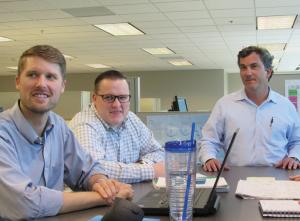
Oko Buckle: Eight countries are represented here.
Dotun Famakinwa: We pride ourselves on that. It brings a different sense of community to the entire office. If you look at the office when we celebrate our Diversity Day, you would see the different dishes, and the different foods. It's something to behold.
There are a lot of colleges around here that we recruit from, Georgia Tech being one of them. They have a very diverse student population that is a good conduit for bringing those people in.
Oko Buckle: He talked about the advantages of being diverse and that diversity of thought. It does also come with its challenges, because we have to learn about the culture of other countries, and we have to find the best way to deal with each and every person on a one-on-one basis.
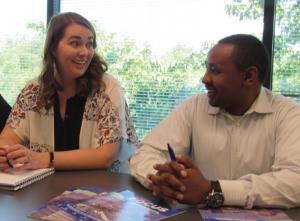
I don't see it as a challenge. To me, it's fun, just trying to learn about people that way.
I think the other thing, too, that makes Burns & Mac one of the great companies to work for is the employee-owner culture. Everybody here owns a piece of this company, and you can see that in the way we work, and the way we interact with each other.
When I started working here I didn't know a lot of people, but I now can just pick up the phone and say, "Hey, I was told to talk to you about this issue," and they will jump in and help. They know that when I'm successful, they're also going to be successful.
Our compensation structure is such that it encourages us to really work as a team at all times.
We're always looking out for each other.
José Rodriguez Alvarez
PUF's Steve Mitnick: What do you do here at Burns and McDonnell?
José Alvarez: I'm the substation department manager for the office in Atlanta, overseeing a team of eighteen engineers, drafters, and technicians.
I manage quality control, which means verifying the drawings before they go out. I'm also in charge of training for everybody within the drafting team and the engineers.
My background is protection control design, so I get involved in that part of the business too.
PUF's Steve Mitnick: How did you get to this point in your career?
José Alvarez: I went to school at the University of Puerto Rico, Mayaguez. It's a top ten school down there. Southern Company went there to hire, and I was the first one hired out of Puerto Rico to work for them.
I moved here from Puerto Rico in 2003 with just a couple of bags and a lot of dreams.
I worked for Georgia Power as a test engineer. I worked there for three years before I decided to try something else. Then I moved to Orlando, Florida, where I worked for Progress Energy, now Duke Energy.
I was a designer. From there, I worked in maintenance, and then management. After a while, I got to lead engineer level and I wanted to try something else, so I started working in the consulting world. I worked for another engineering firm as a director of engineering, overseeing a team of ten.
When I left about four years later, our team was around thirty-five people. We tripled the revenue, and we were doing a lot of business through the southeast.
I decided I wanted to keep growing my career, and that's when I joined Burns and Mac initially, as a project manager down in the newly created Orlando office.
I was employee number four in the Orlando office. Now there are around fifteen, I believe. After a year, they knew my goal was to do much more. I had the opportunity to interview for the substation department manager position and I got it. I relocated to the Atlanta area a year ago to work in the substation power management division.
PUF's Steve Mitnick: What does that division do?
José Alvarez: Basically, we do the physical design, protection control design, telecom, and relays settings within the fence.
PUF's Steve Mitnick: What's the most fun thing about your job?
José Alvarez: It's just to see people grow. As a manager, my job is to help people grow their careers. The better they do, the better I do. If they fail, I'll fail. If we succeed, we all succeed. That's the part I enjoy the most. The way I see it, if they succeed in their careers I'm succeeding as a manager.
Misam Taherbhai
PUF's Steve Mitnick: Misam, what do you do here at Burns and McDonnell?
Misam Taherbhai: I'm the assistant substation department manager for this office. I have a couple of different roles.
One, I manage the junior level engineers and designers. I also manage the projects for Duke Energy Progress, who is one of our clients here.
PUF's Steve Mitnick: How are the junior people doing? Are they coming up to speed early in their careers?
Misam Taherbhai: Yes. They mostly have less than three years of experience. Part of it is training. Part of it is mentoring. Part of it is showing them what the service industry is all about: the engineering consulting world. I like it and I think that's part of the reason why I got the job.
PUF's Steve Mitnick: How did you get to work here?
Misam Taherbhai: This is my first job out of college. I've been with Burns and McDonnell eight and a half years now.
I started here, then went to Kansas City for about seven months in my first year, and met a lot of good people at headquarters. Then I came back here and continued working.
PUF's Steve Mitnick: Where are you from, and which college did you go to?
Misam Taherbhai: I'm originally from India, but I've been in Atlanta since '98. I went to Georgia Tech.
PUF's Steve Mitnick: Is your job fun?
Misam Taherbhai: I enjoy it. I enjoy the variety of projects, working with all the young people, and working with the client almost on a daily basis.
PUF's Steve Mitnick: Are you guys building something?
Misam Taherbhai: I do substation design projects for Duke Energy Progress on the physical side and the protection control side. There could be new substations we're designing for. Or it could be retrofits in existing stations where we are replacing equipment or installing new breakers and new relays in existing transformer yards.
PUF's Steve Mitnick: Why is protection important?
Misam Taherbhai: The electric utilities own a lot of infrastructure. Substation equipment is very expensive, so utilities install preventive measures such as protective relaying to safeguard that equipment. They also provide reliability so that if you turn the switch on, the light is going to come on; or if the lights go out, it's very momentary and they come back on.
There's a lot of work behind the scenes.
PUF's Steve Mitnick: What's a typical day like?
Misam Taherbhai: I come in every morning, and if I'm lucky, there are less than ten unread emails in the inbox. I go through those. Then I tend to each of the projects.
We usually have multiple projects going on and they're at different stages in their life cycle. Some of them are due to the client this week for final submission. Some of them are in between, where they're due to the client for certain reviews, and some of them are just due for internal reviews.
We have a pretty thorough internal review process, so some of them are going through that, just making sure that they're all on track.
Justin Kanitz
PUF's Steve Mitnick: What do you do here at Burns and McDonnell?
Justin Kanitz: I'm a project manager here in the Atlanta office. I'm the account manager for Southern Company. I help manage the relationship with that important partner and I lead many of the projects that we execute for them.
PUF's Steve Mitnick: Are you good at it?
Justin Kanitz: I hope so! They haven't got rid of me yet.
What I try to do is make sure that we see this as a customer service business. We're doing engineering, but my main goal is to make sure that they're well taken care of as a client.
I want them to know we're here to support them in any type of situation that comes up.
PUF's Steve Mitnick: What's a typical day like?
Justin Kanitz: Hopefully not putting out fires. But sometimes that happens. A typical day is checking in with my project teams, making sure that we're on track in terms of our schedules. That we're making progress on our designs, and that we're staying on our budget.
Managing the projects from a high level is typically what I'm doing. Then also interfacing with Southern Company, making sure that we're meeting their expectations and seeing if they have any other areas where we can help.
PUF's Steve Mitnick: How did you get to this point in your career?
Justin Kanitz: I went to the University of Georgia, but I took a long and winding road to get here. I'm a civil engineer by training, but I started out with a small architecture-engineering firm doing site design work for Georgia Power.
Then I got hired here at Burns and McDonnell, and started out doing civil design work. Slowly but surely throughout my career here I've moved inside the fence.
Instead of doing site development I started doing physical design. Fom the very beginning I've loved being around people, meeting new folks. I've been involved in our marketing and client relationships, and that's morphed into leading our project team.
PUF's Steve Mitnick: You don't want to hide behind a computer like some other engineers?
Justin Kanitz: Not me. I think a lot of engineers are like that, but consulting is about client relationships and client service. We don't have the luxury of just being behind a desk with our heads down all the time. We have to make sure that we're engaged with the client, and that we're meeting their needs.
That's the area where I think I bring the most to the table for Burns and Mac: being out there and being involved with those folks.
Hill Baughman
PUF's Steve Mitnick: What do you do here at Burns and McDonnell?
Hill Baughman: I'm the global practice leader for water here in the Atlanta office. I've been with Burns and Mac about three years.
I started my career in the public sector with DeKalb County on the wastewater treatment side. I've been in consulting about thirty years.
I joined Burns and Mac to help head up an operations services group as well as to help grow the Atlanta water presence. This is a market that we had not been in until about four years ago.
For water, Burns and Mac's been here a long time. We design, build and make improvements to the water system. We do water and wastewater, engineering, construction management, and consulting.
Along with some of our other groups, we do everything from rate studies to utility management studies. But our bread and butter is designing and building water and wastewater treatment plants, pump stations, and pipeline design.
PUF's Steve Mitnick: Is it a big field?
Hill Baughman: Water is the lifeblood of our society. We created a very significant water infrastructure over the last century, and now it's time to replace it. Everything has a life cycle.
There's a very large need for infrastructure funding and rehabilitation in this country. In the southeast there's a lot of growth, so you've got to keep up with new facilities, new pipelines, and pump stations.
PUF's Steve Mitnick: How did you get into this field?
Hill Baughman: I put myself through college working at a wastewater treatment plant. I worked at night and went to school during the day.
When I graduated from college I got a chance to be involved working for DeKalb County on a big capital improvement program where we were upgrading the treatment plants there.
So, I got involved in the engineering construction side as an owner, and then later decided to go into the consulting side.
PUF's Steve Mitnick: Is your job fun?
Hill Baughman: I enjoy it because I'm not doing the same thing every day. We're working with different clients, and different problems, and trying to find solutions. The problem solving is the attraction for a lot of us.


